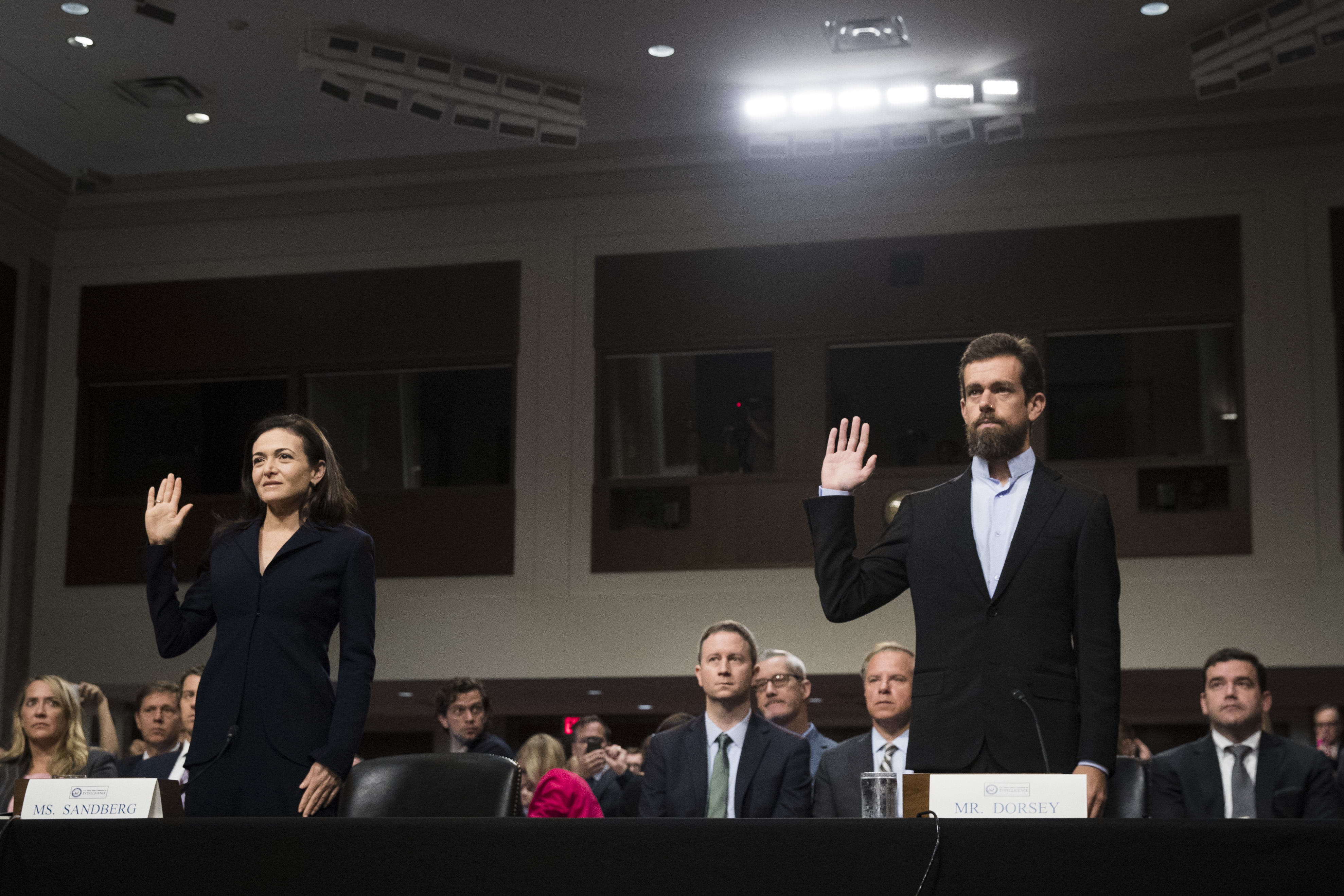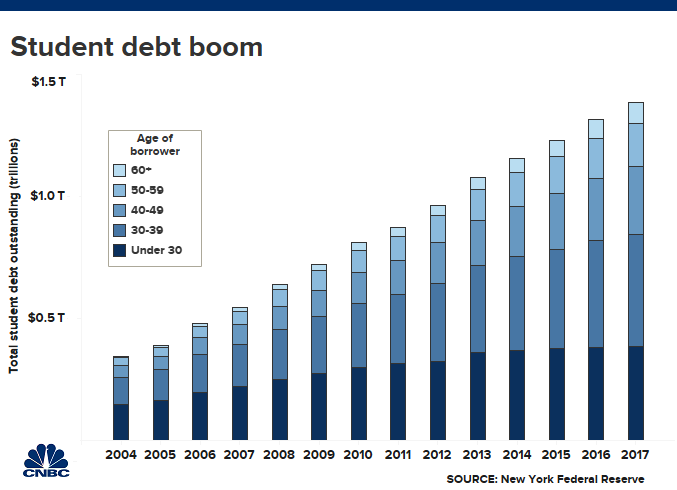
WASHINGTON, DC – SEPTEMBER 5: (L-R) Facebook chief operating officer Sheryl Sandberg and Twitter chief executive officer Jack Dorsey are sworn-in for a Senate Intelligence Committee hearing concerning foreign influence operations’ use of social media platforms, on Capitol Hill, September 5, 2018 in Washington, DC.
Drew Angerer | Getty Images News | Getty Images
Twitter and Facebook have both drawn their lines in the sand on political advertising — or rather, they’ve removed the lines altogether.
Taking an approach of all (in the case of Facebook) or nothing (in the case of Twitter), the CEOs of both companies have championed how their decisions will uphold a true and fair democracy. Political ads make up such a tiny fraction of their revenues, both CEOs have said, that this is a matter of principle, not profit.
But here’s the subtext:
Political advertising matters much less to Twitter than Facebook because political advertisers already leaned much more heavily on Facebook to get their messages out. Facebook’s audience is much larger and broader than Twitter’s, making it a better place for campaigns to target voters with persuasive messaging. Plus, political scrutiny is significantly heightened on Facebook over Twitter, since it faces at least three confirmed antitrust probes in the works.
Viewed in that context, both Twitter and Facebook have made decisions that fall directly in line with the logic of their businesses. For Twitter, shirking political ads is a relatively easy way to stir up headlines and gain praise from prominent Democrats, while sticking it to a competitor. For Facebook, a similar move wouldn’t be so simple.
“If Facebook were to make this decision as well, it would be hugely disruptive in a way that it’s not for Twitter,” said Nicole Perrin, a senior analyst at eMarketer who studies political ads. Perrin estimates the breakdown of digital ad budgets for political campaigns roughly mirror those of commercial advertisers, with Google and Facebook making up about 60% of the spend.
Middle ground
Despite Facebook and Twitter’s slippery slope arguments, the solution to fair digital political advertising doesn’t need to lie in the extremes, according to half a dozen political advertising researchers interviewed for this article.
Ellen Goodman, a professor at Rutgers Law School specializing in information policy law, said limiting micro-targeting would be a more effective place to start than the policies both Facebook and Twitter have in place.
Micro-targeting is “serving up ads or content to these narrowly-sliced segments, personalizing them and taking advantage of vulnerabilities,” Goodman said. “That seems to me like the biggest problem.”
The practice prevents social media users from having a collective discussion around false ads that are politicians are now allowed to run on Facebook, Goodman said. Facebook CEO Mark Zuckerberg has argued that users should be able to make up their own minds about the veracity of ads, but Goodman said micro-targeting inhibits that since often only people the campaign already thinks will be receptive to the messaging see the ads that contain misleading or false claims. Current and past political ads are available in a searchable archives on Facebook and other platforms, however.
To be clear, politicians can run ads with lies and misleading information on TV and radio under U.S. law. Broadcasters are actually required to run ads from candidates for federal office, a policy that emerged as a way to ensure airtime is fairly doled out to candidates. But unlike misleading ads that run on TV, those that run on social media can target such a small group of people that they avoid any potential critics that would challenge their claims.
“It incentivizes the most extremist content,” said Daniel Kreiss, an associate political communications professor at University of North Carolina at Chapel Hill. “It incentivizes things like misinformation and disinformation because campaigns know that they can control their message.”
Winners and losers
When Twitter announced its political ad ban, Will Ritter, a Republican advertising strategist, was nonplussed.
A veteran of the Romney presidential campaign who now owns a political marketing firm, Ritter has spent years buying ads on both TV and digital platforms.
“Fox News will give a two to three point jump in the polls. I can see it,” Ritter said. But with Twitter, “you just weren’t seeing that return on investment.”
Had Facebook been the one to ban political ads, Ritter said he would have been more concerned.
“Facebook has an appeal that’s broader and more balanced,” he said, comparing its audience to Twitter’s which he described as “a place for super insiders” and bots. On Facebook, he said he can target people looking passively for cat videos, while on Twitter, “people come there with their values.”
Ritter’s experience reflects that of advertisers across the political spectrum, according to researchers. Facebook has long been a more important tool for political advertisers, meaning these marketers would have to scramble if Facebook made a decision like Twitter’s.
“The big effect on political campaigns would be they would be looking for other places to spend and I think the very obvious and very immediate beneficiary of that would be Google,” Perrin said.
But even Google is not a perfect solution for campaign strategists looking to grow their email lists for fundraising and events. Google search ads can target users who are looking up a particular candidate, for example, but are less likely to attract someone passively browsing the internet. Given that Facebook and Google own the majority of the digital advertising market, Eric Wilson, a Republican digital strategist, said if Facebook pulled out of political ads, it would be “catastrophic for campaigns because there’s really no Plan B.”
Wilson said Google and Facebook are the only two platforms where campaigns can efficiently reach large audiences. Even though it would make his life harder, he said he’d prefer Facebook be broken up so he had other ways to reach voters.
“I think the clearest place from my perspective that they’re too big is there’s no place else for me to go right now,” Wilson said. “If I want to reach voters, I have to be on Facebook.”
Campaigns aren’t the only ones that would lose out if Facebook got rid of political ads altogether. As Zuckerberg has noted, challengers to incumbent politicians would also likely find it more difficult to reach voters, according to multiple researchers. Challengers have to do more to get their names out than those already in office, and digital ads tend to be much more affordable for new entrants than other forms of advertising.
Nonprofits and grassroots groups could also lose out based on greater political advertising restrictions. Twitter CEO Jack Dorsey said the company’s ban would also cover issue ads, meaning groups pushing messages on a political topic like climate change or abortion will also be cut.
A potentially unintended beneficiary of that policy could be commercial advertisers, said Kreiss, the UNC professor. By virtue of issue ads being banned, an ad urging to plant a tree to stop climate change could be kicked off, for example, while an oil company could freely post its own campaigns, he said.
Regulation
Zuckerberg has asked that he not be the one to make the decisions about Facebook’s future on political ads. Many of his critics have made the same call.
In a March op-ed in The Washington Post, Zuckerberg asked that lawmakers write clearer laws around digital advertising.
Some already have. Sen. Amy Klobuchar, D-Minn., Sen. Mark Warner, D-Va., and the late Sen. John McCain, R-Ariz., originally introduced the Honest Ads Act in 2017. The bill, which proposes that online political ads follow the same transparency rules as TV and media, was reintroduced earlier this year.
“If there were federal regulation about what Facebook had to do like there is about what broadcast networks have to do, that would at least change the public conversation in a pretty significant way,” said Perrin, the eMarketer analyst. Such regulation would take the onus off the tech companies to decide and explain their own policies.
“I don’t see a different way that we stop having this constant fight,” she said.
WATCH: How Facebook makes money by targeting ads directly to you

